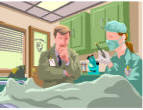Article # 6: What about the Body?
 The body seems quite solid. It appears to change quite rapidly and is easily damaged, bruised and broken. Is this what we consider our 'home', our 'safe haven' from a cold and cruel world, our tower of strength and resiliency?
The body seems quite solid. It appears to change quite rapidly and is easily damaged, bruised and broken. Is this what we consider our 'home', our 'safe haven' from a cold and cruel world, our tower of strength and resiliency?
 We seem to be placing a great deal of trust into this little pile of dust. We look to our bodies to tell us how we are feeling moment to moment, whether we are too hot or too cold, whether we are happy or sad, hungry or thirsty, tired or angry.
We seem to be placing a great deal of trust into this little pile of dust. We look to our bodies to tell us how we are feeling moment to moment, whether we are too hot or too cold, whether we are happy or sad, hungry or thirsty, tired or angry.
We have mis-placed our focus, once again.
The body is simply a tool, a learning device that may serve us, not the other way around. The body does not have 'a mind of its own'. The body does not have a grasp of the situation if only we could communicate better with it. The body does not know anything.
The body functions for us. When left to its own devices, the body pretty much takes care of itself. The body causes our hearts to beat, our lungs to breathe, our nerves to transmit impulses that go to other parts of the body to tell them what to do. The body does this and so much more all without so much as a little push from us.
But who is in charge of all this? Does the body tell us what to do or do we tell the body what to do? Or is it some kind of cooperative effort between us and our bodies, where the responsibilities are shared, thus lessening the burdens we must carry?
The body is simply a tool, a learning device for the mind. The body does not think, it follows orders, intentions, that we give to it.
We have endowed our bodies with intentions and purposes and meanings that go way beyond what we might think of doing with, for example, a pair of pliers or a car or a lawn mower.
Our bodies respond to our directives. We are in charge, period.
Our minds direct our bodies. Yes, many things our bodies do are sort of on 'automatic' and do not require our conscious direction, like breathing. And we are very good at passing the buck, so we tend to give over so many things we do to the body and let the body do it for us. And, after awhile, we forget that we did this to start with, we think the body is quite capable to take charge of these many things without interrupting us as we go about our busy days.
Our bodies are simply tools, learning devices of our minds. Our bodies respond only to the intentions of our minds.
Our bodies are our best tools for letting us know what our intentions really are. When, mentally, we feel threatened, our bodies respond in a 'fight or flight' mode. When we feel happy, our bodies reflect that feeling. When we feel angry, our bodies reflect that feeling, also.
When we are in awareness of the Spirit of Love, our bodies reflect this and return to their perfect functioning.
When we are feeling angry or hateful, our bodies reflect this, as well, and start witnessing these feelings through various malfunctions of body systems. If the angry feelings continue long enough, eventually the body exceeds it ability to repair itself and finally it breaks down.
A faulty body? Or faulty thinking on our part, as witnessed to by our bodies?
We frequently seek outside help in trying to fix what is really an internal problem, internal to our minds, not our bodies. We take pills, we have surgeries, we have various therapies to effect the body. But the problem is not of the body. The body is simply a witness to our thinking, our beliefs, our emotions.
The body is an effect and not a cause.
By busy-ing ourselves trying to fix an effect, we guarantee that our fix will not be experienced.
So, the question becomes, how do we go about fixing things that we believe need to be fixed?
Our next article will summarize what we have discussed about body, mind-Mind and Spirit, in order to help us focus on "fixing" what is broken.